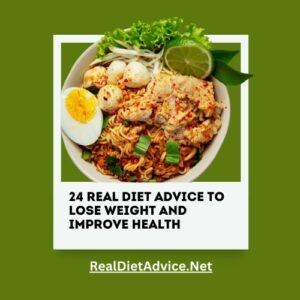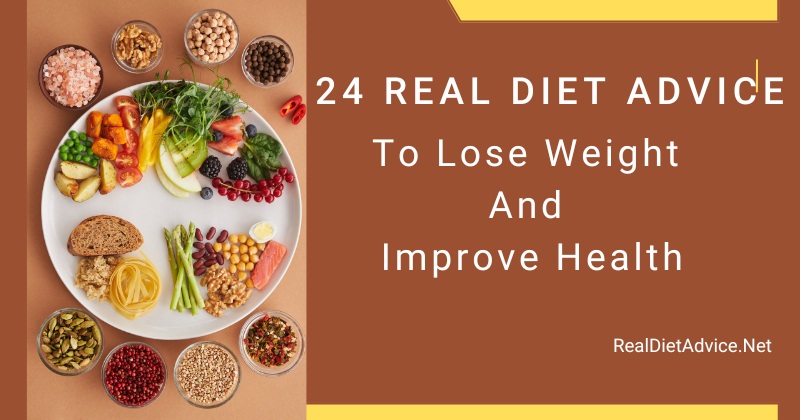Below are the 24 real diet advice to lose weight and improve health. But, there’s a lot of information available on the Internet to help you lose weight and get fit.
This seemingly endless list of tips can be confusing and overwhelming if you are looking for ways to lose weight and maintain it.
Every day, it seems that a new diet fad is born. From diets that promote raw foods to meal plans centered around prepackaged food and shakes.
Most people are unable to maintain these diets, and even though they may result in a short-term loss of weight, many can’t. They give up after a few weeks.
While it may be tempting to lose 10 pounds (4.5kg) in one week with a fad-diet, this is usually unhealthy and not sustainable.
Adopting a healthy life style that is tailored to your needs and can be maintained for the rest of your life will help you lose weight safely and successfully.
These Real Diet Advice Will Help You Get Back On Track To Reach Your Fitness And Weight Goals.

Dieting is a great way to improve health and lose weight.
1. Load Fiber
Fiber can be found in many healthy foods, including fruits, vegetables, whole grains, beans, and legumes. Some studies show that eating fiber-rich food may help you to lose weight. You can easily increase your fiber intake by adding beans to salads, eating oatmeal for breakfast, or snacking on nuts and seeds rich in fiber.
2. Sugar is a bad thing.
Sugary drinks and added sugar are a leading cause of unhealthy weight gain, diabetes, and heart disease.
Foods like soda, candy and baked goods with lots of sugar tend to have very little nutrition. It is possible to reduce excess weight by avoiding foods that contain added sugars. Even foods marketed as “organic” or “healthy” can contain a lot of sugar. It is important to read nutrition labels.
3. Eat more healthy fat
Healthy Fats are actually a great way to help you lose weight.
Several studies have shown that a diet high in fats, such as olive oil, avocados, and nuts, can maximize weight loss.
Fats also help you to feel fuller longer, reducing cravings and helping to stay on track.
4. Eliminate Distractions
Eating while distracted can cause you to consume extra calories and gain weight.
It’s important to eat at the table to avoid distractions. This allows you to spend time with your loved ones.
You should also put your smartphone aside when you are eating. You can be just as distracted by scrolling through your Instagram, Facebook or emails as you are by a television or computer.
5. Walking for Health and Fitness
Many people think they need to adopt an intense exercise regimen in order to lose weight.
Walking is a great way to burn off calories.
Walking 30 minutes per day can help you lose weight .
It’s a fun activity you can enjoy indoors or outdoors at any time.
6. Bring out your Inner Chef
It has been proven that cooking more meals at home can promote weight loss and healthy diet.
While eating out is fun and can be part of a healthy diet, cooking more at home will help you maintain a healthy weight.
You can also save money by preparing your meals at home.
7. Enjoy a Breakfast Rich in Protein
It has been proven that eating foods rich in protein, such as eggs for breakfast can help you lose weight.
You can lose weight by swapping your cereal with a protein-rich scramble that includes eggs and sauteed vegetables.
Increase your intake of protein in the morning to help control your appetite and avoid unhealthy snacks.
8. Don’t Drink Your Calories
Even drinks that are advertised as being good for health or boosting athletic performance can contain unwanted ingredients.
The calories in sports drinks, coffee beverages, and flavored waters are usually high.
If you drink too much juice, even though it is advertised as a healthy drink, you can gain weight.
To minimize your calorie intake, drink water throughout the day.
9. Shop Smart
A shopping list is an excellent way to prevent impulsive purchases of unhealthy food.
Making a list of what you need to buy can lead to healthier food choices and weight loss.
A healthy meal or snack is another way to limit your purchases of unhealthy items at the supermarket.
According to studies, hungry shoppers are more likely to choose unhealthy food with high calories.
10. Stay Hydrated
It is important to drink enough water every day. This can help maintain your health.
In a study of more than 9,500 participants, those who weren’t properly hydrated were found to have higher BMIs and be more obese.
It has been proven that people who drink water prior to meals consume fewer calories
11. Practice Mindful Eating
You may consume too much food if you eat on the run or rush through your meals.
You should instead be aware of the taste of each bite. This may help you become more aware of your hunger and reduce the chances of you overeating.
Even if your time is limited, focusing on enjoying and eating slowly can help you reduce overeating.
12. Reduce your intake of refined carbs
Sugars and grains stripped of their fibers and nutrients are refined carbs. White flour, pasta, and bread are examples.
These foods are high in fat, low in fiber and are quickly digested. They only make you feel full for a brief period of time.
Choose complex carbohydrates such as oats or ancient grains like barley and quinoa, or vegetables like carrots and potatoes.
These sources of carbohydrates are rich in nutrients and will keep you feeling fuller longer.
13. Lift Heavier and Get Lighter
Many people focus on cardio only and neglect strength training.
Weight lifting can help tone and build muscle throughout your body.
Weight lifting can also boost your metabolism, allowing you to burn more calories during the day.
14. Make Goals That Matter
People want to lose weight for many reasons. They may be trying to fit into their high school jeans or look better in a bathing suit.
It’s more important to understand the reasons why you want weight loss and how it can positively impact your life. These goals can help you stay on track with your plan.
You can stay committed to positive change by setting goals such as being able to play with your kids or dancing all night long at the wedding of a friend.
15. Avoid Fad Diets
Fad Diets are advertised for their ability to make people lose weight quickly.
These diets are often very restrictive and difficult to maintain. It can lead to yoyo dieting where people gain weight after losing it.
Yo-yo diets are common among those who want to lose weight quickly. However, they have been shown to cause a gradual increase in body mass over time.
Studies have also shown that yoyo dieting increases the risk of diabetes and heart disease. It can also increase blood pressure, metabolic syndrome, and high blood sugar.
It may be tempting to try these diets, but a healthy, sustainable eating plan that feeds your body, rather than depriving, is the better option.
16. Whole Foods
Keep track of what you put into your body.
By eating whole food without an ingredient list, you can ensure that your body is nourished with natural and nutrient dense foods.
Less is more when purchasing foods that have ingredient lists.
It is likely that a product with a lot of ingredients you don’t recognize will not be the healthiest choice.
17. Find a buddy
Invite a friend along to help you stick to your workout plan or eating plan.
According to studies, people who lose weight with a friend tend to be more committed. They tend to lose weight faster than people who do it alone.
Plus, having someone with similar health and wellness goals to you can keep you motivated.
18. Don’t Deprive Yourself
You may set yourself up for failure if you tell yourself you’ll never eat your favorite food again.
You may end up binge eating when you finally give in.
Allowing yourself to indulge in small amounts of unhealthy food will help you develop self-control. You’ll also feel less resentful about your new healthy lifestyle.
A healthy relationship with food includes being able to eat a small amount of a home-made dessert or a favorite holiday meal.
19. Be Realistic
Comparing yourself with models or celebrities in magazines and on TV can be unhealthy.
Being too critical of yourself may set you back, and lead to unhealthy behavior.
Focus on your feelings rather than how you look. You should aim to be happier, healthier and fitter.

20. Fill up on Veggies
Vegetables contain fiber and nutrients that your body needs.
Increasing your vegetable consumption may also help you to lose weight.
Studies show that eating a small salad before your meal can make you feel more satisfied, which will lead you to consume less food.
Filling your day with vegetables can also help you maintain a healthy body weight, and reduce the risk of chronic diseases such as heart disease and diabetes.
21. Healthy Snacks
Weight gain can be caused by unhealthy snacks.
Make sure you have healthy snack readily available in your home, car, and workplace.
You can stay on track by having pre-portioned mixed nuts or veggies cut up and ready to eat in the fridge when you get a craving.
22. Take Time For Yourself
If you want to live a healthier life, it is important that you put yourself first.
Weight loss and fitness goals are often hampered by life. It is therefore important to develop a plan, which includes time for yourself, and to stick to it.
Your health is just as important as your work or parenting responsibilities.
Setting aside time for yourself to care for your mental and physical health can be as simple as preparing a healthy meal to bring to the office, or going on a run.
23. Find Exercises You Enjoy
There are so many options when it comes to choosing an exercise routine.
Mountain biking in the park may be a better option for you than sweating it out during a spin class.
Some activities burn more than others. You shouldn’t pick a workout solely based on the results that you expect to get.
Find activities you enjoy and make you feel happy. You’re more likely to keep up with the activities if you enjoy them.
24. Support is Everything
It is important to have a support group of family and friends who will help you achieve your wellness and weight loss goals.
You will stay motivated if you surround yourself with people who are positive and make you feel good.
Studies have shown that people who attend support groups and maintain a strong network of friends and family are more likely to lose weight.
You can achieve your goals by sharing them with family and friends who are supportive and trustworthy.
Join a support group if you do not have family or friends who are supportive. Many groups meet online or in person.
Final Thoughts
There are many ways to achieve weight loss, but finding a plan that is healthy and easy to follow will ensure long-term success.
While fad dieting may seem like a quick fix to weight loss, it is often unhealthy, depriving the body of essential nutrients and calories. This leads to most people returning to their old habits once they reach their goal.
You can be healthier and happier by being more active, eating whole foods, reducing added sugar, and taking time for yourself.
Weight loss isn’t a one-size fits all thing. It is essential to choose a weight loss plan that fits your lifestyle and works for you.
This is not a one-size-fits-all process. Try starting with a few suggestions if you don’t want to commit to the whole article. You’ll be able to reach your health and fitness goals in a sustainable and safe way.
FAQ’s
- How can increasing fiber intake aid in weight loss?
Fiber can be found in many healthy foods, including fruits, vegetables, whole grains, beans, and legumes. Eating fiber-rich food may help you lose weight. You can easily increase your fiber intake by adding beans to salads, eating oatmeal for breakfast, or snacking on nuts and seeds rich in fiber1. - Why should one reduce sugar intake when trying to lose weight?
Sugary drinks and added sugar are a leading cause of unhealthy weight gain, diabetes, and heart disease. Foods with a lot of sugar tend to have very little nutrition. Reducing intake of foods that contain added sugars can help reduce excess weight. Even foods marketed as “organic” or “healthy” can contain a lot of sugar, so it’s important to read nutrition labels2. - How can healthy fats contribute to weight loss?
Healthy fats are a great way to help you lose weight. Several studies have shown that a diet high in fats, such as olive oil, avocados, and nuts, can maximize weight loss. Fats also help you to feel fuller longer, reducing cravings and helping to stay on track3. - Why is it important to avoid distractions while eating?
Eating while distracted can cause you to consume extra calories and gain weight. It’s important to eat at the table to avoid distractions. This allows you to spend time with your loved ones and focus on the meal. Distractions can be as varied as scrolling through your social media or watching TV4. - How can walking contribute to health and fitness?
Walking is a simple and effective way to burn off calories. Walking 30 minutes per day can help you lose weight. It’s an enjoyable activity that you can do indoors or outdoors at any time5. - Why is it beneficial to cook more meals at home?
Cooking more meals at home can promote weight loss and a healthy diet. While eating out is fun and can be part of a healthy diet, cooking more at home will help you maintain a healthy weight. It also allows you to save money by preparing your meals at home6. - Why is a protein-rich breakfast helpful for weight loss?
Eating foods rich in protein, such as eggs for breakfast can help you lose weight. Increasing your intake of protein in the morning can help control your appetite and avoid unhealthy snacks later in the day7.
Recommended Post For You
- Evidenced-Based Eating: Exploring 5 Diets That Have Stood the Test of Science
- The Quality-First Approach: Uncovering The Ultimate Diet Secret
- Holistic Nutrition: Exploring the Connection Between Diet, Mind, and Body
- Nature’s Bounty: Embracing the Raw Food Diet for Optimal Health and Wellness
- What is Healthy Balanced Diet? Discover the Key Components of a Healthy Balanced Diet for Optimal Wellness
- The Science of Healthy Eating: Cutting Through the Noise of Fad Diets
- Breaking the Cycle: Unraveling the Complex Relationship Between Stress and Emotional Eating
Here are a few trusted sources that offer general guidance on healthy eating and weight loss:
- Mayo Clinic: The Mayo Clinic provides evidence-based information on various health topics, including weight loss and nutrition. You can find articles, guidelines, and tips on their website: https://www.mayoclinic.org/healthy-lifestyle
- National Institute of Diabetes and Digestive and Kidney Diseases (NIDDK): NIDDK, a part of the U.S. National Institutes of Health (NIH), offers resources on weight management and nutrition. You can access their information on healthy eating and weight loss here: https://www.niddk.nih.gov/health-information/weight-management
- American Heart Association (AHA): The AHA offers guidance on heart-healthy eating and weight management. Their website provides information on diet, nutrition, and lifestyle changes for better health: https://www.heart.org/en/healthy-living/healthy-eating
- Harvard T.H. Chan School of Public Health: The nutrition department at Harvard University provides evidence-based articles and resources on diet and weight loss. You can find information on healthy eating, weight management, and more on their website: https://www.hsph.harvard.edu/nutritionsource/
- Academy of Nutrition and Dietetics: The official website of the Academy of Nutrition and Dietetics offers information on nutrition, weight management, and healthy eating. You can find articles, tips, and resources here: https://www.eatright.org/
Please note that while these sources provide reliable information, it’s always a good idea to consult with a healthcare professional or registered dietitian for personalized advice based on your specific needs and health conditions.
